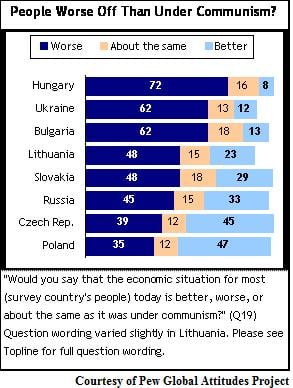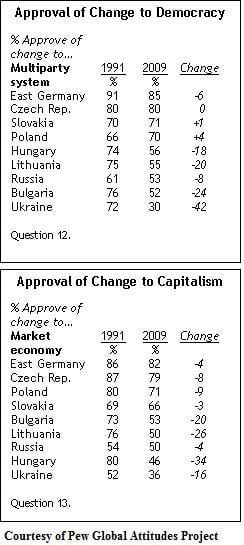
After twenty years of post-Communism, it’s time to ask: cui bono?
According to a sweeping Pew Research Center poll of Eastern Europeans released yesterday, “the prevailing view in Russia, Ukraine, Lithuania, Slovakia, Bulgaria and Hungary is that people were better off economically under communism. Only in the Czech Republic and Poland do pluralities believe that most people are now better off”.
 And within those societies, the primary beneficiaries of the transition were the elites.
And within those societies, the primary beneficiaries of the transition were the elites.
“It was the young, the better educated and the urban populations who were cheering [the post-Communist order]. How older, less well educated and rural people would adapt was then identified as one of the principal challenges to acceptance of democracy and capitalism”.
Moreover, whereas communism may have offered, in Churchill’s famous dictum, an equal distribution of poverty, the fruits of democracy have been distributed very unequally indeed.
“There are now wide age gaps in reports of life satisfaction. In Poland, for example, half of those younger than age 30 rate their lives highly, compared with just 29% of those ages 65 and older. These gaps were not evident in 1991, when all age groups expressed comparably negative views of their lives”.
Moreover, an “urban-rural gap also is evident in life satisfaction…In Ukraine, for example, 30% of urban dwellers express high satisfaction with their lives, compared with just 17% of those residing in rural areas. These disparities in reports of well-being were not apparent two decades ago”.
Given the views about their material situation today vs under the former regimes, it is not surprising to find fewer people satisfied with the transition to democracy and capitalism:
 (With regards to democracy itself, there is definitely a large split between Eastern Europe and the countries of the former Soviet Union, with the former being much happier with the political transition than the latter. One factor that might explain the popularity of the democratic transition in Eastern Europe is that it was essentially a process of liberation from an outside occupier, the USSR).
(With regards to democracy itself, there is definitely a large split between Eastern Europe and the countries of the former Soviet Union, with the former being much happier with the political transition than the latter. One factor that might explain the popularity of the democratic transition in Eastern Europe is that it was essentially a process of liberation from an outside occupier, the USSR).
Ironically for a process that ushered in a new era of religious freedom in Eastern Europe, the transition to democratic capitalism assumed the very opposite trajectory to the one Jesus preached when he said that “the last shall be first, and the first shall be last” (Matthew, 19:30).
Instead, the transition quickly rectified the ‘unnatural’ order of the old regime- in which the first (the rich and talented) had temporarily been made last.
Henceforth, the masses-the old, the poor, the average and the rural-were returned to being last again, where they belong; so that the elite- the young, educated, talented and urban-could finally resume the rightful first place they occupied before the whole Communist/Christian debacle.